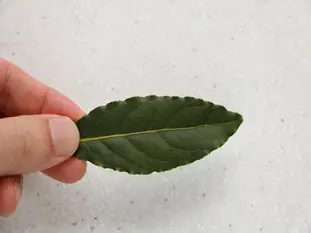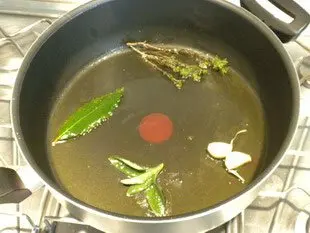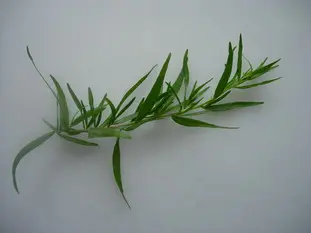Herbs and temperature

I have already talked to you about herbs in cooking, and about their great power of "seduction". The example of a salad is a great classic: on its own, it's a salad, which is normal, but the same salad in which you have added finely chopped fresh herbs, just before serving, you have much more than a salad.
Herbs transcend recipes, small addition and big effect, with just a little chives, chervil, parsley, etc.
Herbs transcend recipes, small addition and big effect, with just a little chives, chervil, parsley, etc.
12 K 4.8/5 (16 reviews)
Keywords for this post:HerbsCookingTemperatureLast modified on: April 25th 2020
Herbs and temperature
What if we heat it up? What about the herbs that we are going to consume after cooking (vs raw), it's a bit the same principle, we add them to a dish or a recipe, and they always make their little effect?
Well it depends in fact, it depends on the herb itself or more exactly its active principle, its essential oil if you prefer, and which must pass from the herb in the dish for our greatest happiness.
And there attention, all the herbs are not equal, because the active ingredient they contain supports more or less well the heat.
Here is a specific example, tarragon, its active ingredient is estragol and unfortunately estragol evaporates at 50°C (approximately) which means that if you put it in a dish that goes in the oven for a long time, well it's almost useless because the taste will have evaporated during cooking and in the best case there will just be traces of it. Disappointing...
It is a little less true for parsley which is less sensitive to heat, and can be cooked better.
Another way to do it is to combine the 2 methods: herbs at the beginning for more nuanced notes, and herbs at the end for fresher and more pronounced notes.
To sum up: For a recipe with herbs, and depending on the herbs, it is often better to incorporate the herbs at the end of cooking, chopped up at the minute.

Well it depends in fact, it depends on the herb itself or more exactly its active principle, its essential oil if you prefer, and which must pass from the herb in the dish for our greatest happiness.
And there attention, all the herbs are not equal, because the active ingredient they contain supports more or less well the heat.

Here is a specific example, tarragon, its active ingredient is estragol and unfortunately estragol evaporates at 50°C (approximately) which means that if you put it in a dish that goes in the oven for a long time, well it's almost useless because the taste will have evaporated during cooking and in the best case there will just be traces of it. Disappointing...
What to do?
All is not lost, it is enough to proceed differently, and to add the chosen herb at the last moment, the dish already taken out of the oven, and a few minutes before serving. This way you will have the expected taste, and in addition a certain freshness of taste due to the fresh herbs added. This is especially true for herbs that are very sensitive to heat: chives, tarragon and chervil in particular.It is a little less true for parsley which is less sensitive to heat, and can be cooked better.
Another way to do it is to combine the 2 methods: herbs at the beginning for more nuanced notes, and herbs at the end for fresher and more pronounced notes.
Does this apply to all herbs?
No, there are some that have an active principle with a very high evaporation temperature (like 250°C), but with those you can go ahead and let it simmer or infuse for a long time: bay leaf, thyme and vanilla for example.To sum up: For a recipe with herbs, and depending on the herbs, it is often better to incorporate the herbs at the end of cooking, chopped up at the minute.
Lasts posts
XO Cognac Explained: Meaning, Aging, and Flavor Profile
XO Cognac always goes beyond the labels on the bottle: it is often associated with tradition and quality. You get to appreciate the artistry, character and ageing process when you understand what defines this smooth Cognac. The section below tackles everything about XO Cognac, from complex flavour...January 28th 2026924 Sponsored article
Butter vs. grease
We often read in a recipe where a pastry is put into a mould that, just before pouring, the mould should be buttered or greased. But what's the difference between these 2 terms?December 1st 20252,6145
Getting out of the fridge early
Very often when you're cooking, you need to take food or preparations out of the fridge, to use them in the recipe in progress. There's nothing tricky about this: you just take them out of the fridge and use them, usually immediately, in the recipe. But is this really a good method?November 24th 20251,6885
Who's making the croissants?
When you look at a bakery from the outside, you naturally think that in the bakery, the bakers make the bread, and in the laboratory, the pastry chefs make the cakes. It's very often like that, with each of these professions having quite different ways of working, but sometimes there's also one...November 23th 20251,530
Oven height
When we put a dish or cake in the oven, we naturally tend to put it on the middle shelf, and that's what we usually do. But in some cases, this position and height can be a little tricky, so let's find out why.October 8th 20255,1255
Other pages you may also like
Remove bones from fish
Let's talk about fish: It's not a scoop, it's much more pleasant to eat fish from which all the bones have been carefully removed, even if it's a rather painful and time-consuming job, the result is worthy of your efforts. Here are some important points to keep in mind.October 16th 202114 K5
Tranché, dissociated, failed, in short... missed!
When preparing a sauce or a cream, there's always a (small) risk that the creamy preparation you're working on will suddenly separate into two parts of different textures: a liquid part, for example, and a more or less solid part, or even become lumpy. It's terribly frustrating, but we'll see...June 19th 202314 K5
The 3 kinds of meringue
Meringue – what could be simpler? Just beaten egg whites with sugar added. This makes a fairly stiff mixture which can then be cooked in a cool oven to create those lovely, light confections. But in the world of professional patisserie, meringue comes in three different kinds. Even if the...June 14th 201365 K4.5
What is the difference between bakery and patisserie?
This is a question that you may well have asked yourself and which I will attempt to answer. In France the two trades of "boulangerie" (bakery) and "pâtisserie" (patisserie and confectionery) have always been quite distinct, but where exactly do the boundaries lie? .February 7th 2017135 K 14.1
Is it really necessary to cream egg yolks?
Let’s try and answer a question that crops up in cookery and patisserie, even if it verges on the existential: do the egg yolks in a custard recipe really need to be beaten until pale, or not?February 28th 201845 K4.3
Post a comment or question
Follow this page
If you are interested in this page, you can "follow" it, by entering your email address here. You will then receive a notification immediately each time the page is modified or a new comment is added. Please note that you will need to confirm this following.
Note: We'll never share your e-mail address with anyone else.
Alternatively: you can subscribe to the mailing list of cooling-ez.com , you will receive a e-mail for each new recipe published on the site.









